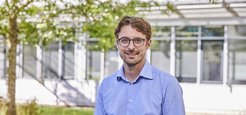Johannes Rebelein is awarded the VAAM Research Prize 2024
Dr Johannes Rebelein, Emmy Noether research group leader at the Max Planck Institute in Marburg, characterised a bacterial enzyme that can convert carbon dioxide (CO2) into hydrocarbons. This unique natural mechanism could make the greenhouse gas usable for the production of sustainable chemicals, fuels or plastics. Rebelein has been awarded the 2024 Research Prize of the Association for General and Applied Microbiology (VAAM) for this discovery. The prize, for outstanding current work in the field of microbiology and endowed with 10,000 euros, was awarded by the VAAM at its annual conference in Würzburg on 2 June 2024.

The enzyme that Rebelein is studying, nitrogenase, catalyses one of the most difficult reactions in nature: the conversion of molecular nitrogen (N2) into ammonia (NH3). To do this, it has to break the strong triple bond of stable N2. However, Rebelein found that, surprisingly, nitrogenases also reduce CO2 to hydrocarbons. This makes nitrogenases the only biocatalysts in nature that can convert CO2 directly into usable hydrocarbon chains.
So far, three different nitrogenases have been identified. Last year, Rebelein and his team solved the structure of the little-studied iron (Fe) nitrogenase. This enzyme complex from the purple bacterium Rhodobacter capsulatus has a special architecture and eight iron atoms in its active centre. "Nitrogenase has two symmetrical halves that 'communicate' with each other," explains Rebelein. This allows the enzyme to reduce CO2 to formic acid (formate) and methane simultaneously in the two active centres. "This challenges our entire understanding of nitrogenases, because Fe-nitrogenase is obviously also a CO2 reductase 'in normal bacterial life'.
The two products of Fe nitrogenase serve as a food source for other microorganisms to generate energy and build biomass. Beyond the impact on the natural microbiome, these products are of great value to the bio-economy, for example in the production of green fuels and plastics. Because the bacterium Rhodobacter capsulatus generates energy from sunlight in a similar way to plants, it could use light to convert carbon waste into chemicals. This offers solutions for a carbon-neutral and sustainable society.
"First, we need to gain a comprehensive understanding of the metabolism of R. capsulatus," says Rebelein. The next step is to modify and improve the nitrogenase and optimise the metabolic pathways.
The VAAM recognises Rebelein's research as "highly innovative, combining biochemistry, synthetic biology and microbiology in a unique way. His strength lies in his ambition and courage to explore new avenues of research. For example, he has developed and established his own model system for nitrogenase research. His recent publications in prestigious journals provide new insights into the structure of nitrogenase and the life of Rhodobacter capsulatus. Further exciting publications are in the pipeline. The VAAM also underlines Rebelein's commitment to the institute.
"I am delighted to receive this award, not only as recognition of our research," says Johannes Rebelein. "It also shows that our work on nitrogenase and the contribution it can make to a bio-based technology is visible and recognised in the field of microbiology."
Dr Johannes G. Rebelein is the Emmy Noether junior research group leader at the Max Planck Institute for Terrestrial Microbiology and at the SYNMIKRO research centre. He studied biotechnology at the Technical University of Braunschweig and completed his doctorate in 2016 under Prof. Dr Markus W. Ribbe at the University of California in Irvine (USA). This was followed by a postgraduate research position under Prof. Dr Thomas Ward at the University of Basel (Switzerland).
The VAAM represents around 3,500 microbiologically oriented scientists from research and industry. The range of research topics extends from bacteria, archaea and fungi in food and water to pathogens, genome analyses and the industrial use of microorganisms and their enzymes. This year's annual conference will take place in Würzburg from 2 to 5 June, this year together with the DGHM (German Society for Hygiene and Microbiology).
Anja Störiko (VAAM)












